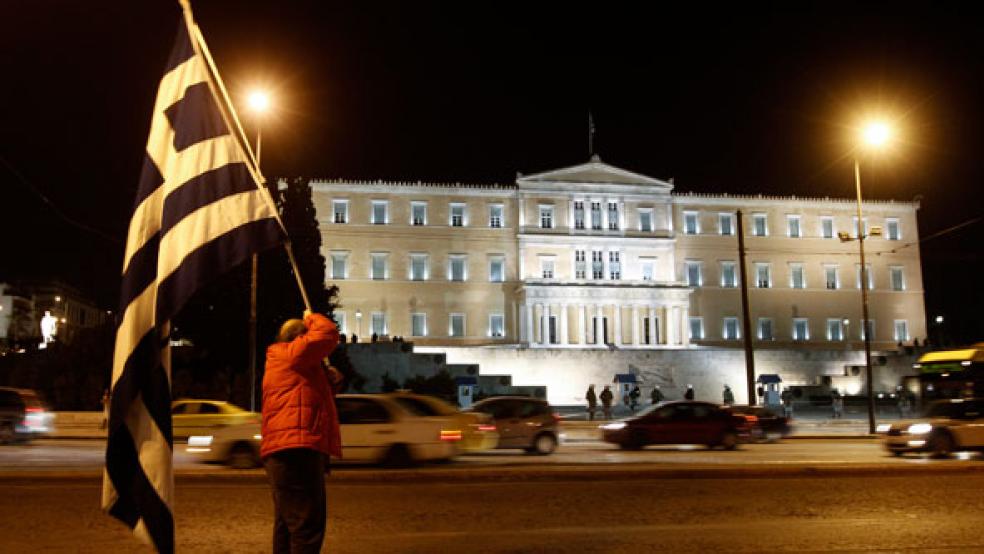Parties committed to Greece's bailout were on course to secure a parliamentary majority on Sunday and the radical leftists who had vied for first place conceded defeat in an election that could keep the debt-laden country in the euro zone.
An official projection released by the interior ministry showed conservative New Democracy taking 29.5 percent, with the radical leftist SYRIZA bloc just behind on 27.1. The PASOK Socialists were set to take 12.3 percent of the vote. Because of a 50-seat bonus given to the party that comes first, that result would give New Democracy and PASOK 161 seats in the 300-seat parliament in an alliance committed to a 130 billion euro ($164 billion) EU/IMF bailout keeping the country from bankruptcy.
"I am relieved," smiling New Democracy leader Antonis Samaras told Reuters, leaving his office to joyous chants from supporters. "I am relieved for Greece and Europe. As soon as possible we will form a government." Samaras said in a speech that the country would honor its commitments to its euro zone partners. "The Greek people voted today to stay on the European course and remain in the euro zone... there will be no more adventures, Greece's place in Europe will not be put in doubt," he said.

SYRIZA leader Alexis Tsipras, a 37-year-old former communist who has shot from obscurity to global celebrity in a matter of weeks, called Samaras to concede defeat, a SYRIZA spokesman told Reuters. The result, however, exposed a deeply divided society, and could leave emboldened an SYRIZA leading new protests against a coalition governing with significantly less than 50 percent of the electorate's support.
PASOK leader Evangelos Venizelos called for a government that would include SYRIZA, but the radicals ruled out joining a coalition that would stick to the austere bailout terms that have helped condemn Greece to five years of record recession. Tsipras had vowed to tear up the terms, betting that European leaders cannot afford the financial market turmoil that could be unleashed by cutting a member of the euro zone loose.
The projection was based on votes counted on the spot at about 12 percent of polling stations and sent to the ministry via text message. It proved highly accurate in an earlier May 6 election, which produced stalemate, though the figures are subject to a margin of error which leaves a degree of uncertainty. Earlier exit polls produced a similar result to the government projection, giving New Democracy and PASOK 159 seats combined.
Greece's lenders say a new government must accept the conditions of the bailout - on top of a 110 billion euro package in 2010 - or funds will be cut off, driving Athens into bankruptcy.
A Greek euro exit has the potential to unleash shocks that could even break up Europe's single currency and plunge the global economy into chaos. The result will dominate a meeting of the Group of 20 world economic powers in Mexico on Monday. Central banks from major economies stand ready to take steps, including coordinated action, to stabilize markets if the election triggers a financial storm or public panic, G20 sources told Reuters last week.
They may well not be needed.
The euro hit a three-week high against the U.S. dollar, rising to around $1.2730 in early Australasian Monday trade, from around $1.2655 late in New York on Friday. It hit its strongest since May 22 according to Reuters charts. "What stands out is how close SYRIZA came... so we expect some robust opposition to the austerity measures," said Daragh Maher, currency strategist at HSBC in London. "Markets will be concerned about how narrow the margin of victory was for ND and any gains in the euro and other markets will be limited."
LAST CHANCE
The ultra-right Golden Dawn party looked set to win 18 seats, underscoring the fragmentation of a society wrestling with unemployment of almost 23 percent and plummeting living standards. The traditional ruling parties of New Democracy and the PASOK Socialists are accused by many Greeks of presiding over decades of corruption and waste that have left them with a ruined economy and one of the heaviest debt burdens in the world.
Five years of recession and more than two years of acute crisis have started to fray the edges of Greek society, undergoing its severest test since the overthrow of the military dictatorship in 1974. The streets of central Athens are scarred by repeated waves of protests, some hospitals are short of vital medicines and reports of suicides caused by the crisis have become routine.
Samaras has called for an extra two years to make the cuts demanded of his country. But Greece's euro zone peers are prepared only to tinker with the deal and then only with a government firmly committed to the bailout. "There can't be substantial changes to the agreements but I can imagine that we would talk about the time axes once again, given that in reality there was political standstill in Greece because of the elections, which the normal citizens shouldn't have to suffer from," German Foreign Minister Guido Westerwelle said on German TV station ARD. "But there is no way out of the reforms. Greece must stick to what has been agreed," he said.
Opinion polls show Greeks, weary and disillusioned after five years of deep recession, overwhelmingly favor remaining in the euro and just as opposed to the austerity drive. "I voted for the bailout because these are the terms that will keep us in Europe," said 66-year-old English teacher Koula Louizopoulou after casting her ballot in Athens, hinting that she had chosen New Democracy.
"It's the first time I feel depressed after voting, knowing that I voted again for those who created the problem, but we don't have another choice," she added.
Additional reporting by Harry Papachristou, Karolina Tagaris, George Georgiopoulos, Maria Paravantes, Deepa Babington, Dina Kyriakidou and Michael Stott


